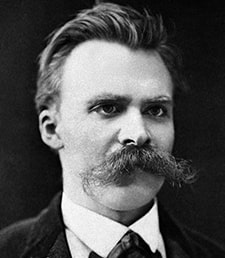Friedrich Nietzsche (1844 – 1900) was a famous German scholar who wrote about important topics like philosophy and culture. He has been very influential in recent times, and many people think he is one of the most important thinkers of contemporary philosophy.
He questioned the reasons behind traditional Western religions, morals, and philosophies, and this affected many theologians, philosophers, psychologists, poets, novelists, and playwrights. After his infamous declaration that “God is dead” Enlightenment thinkers began to think about what kind of society they wanted to create as autonomous humans.
Nietzsche had a great education, starting with a good school and then going on to get a degree in classical philology from one of the best universities. At 24, he was the youngest person ever appointed to that post. His teacher Friedrich Wilhelm Ritschl wrote in his letter of reference that Nietzsche was so promising that “He will simply be able to do anything he wants to do”
Nietzsche studied philology at university, but he was also interested in philosophy, especially the work of Arthur Schopenhauer and Friedrich Albert Lange. Nietzsche had planned to continue his education by taking a second degree in philosophy, this time studying theories about teleology (purpose) in the years since Kant.
Nietzsche wrote his first book called “The Birth of Tragedy out of the Spirit of Music” in 1872. He was not a classical musician, and he didn’t write the book for scholars. He wrote the book to argue that Wagnerian music-drama might be the source of a new, tragic culture for contemporary Germany. Many people in classical studies didn’t like the work. After writing the first book, Nietzsche continued to write essays for a wider audience, publishing pieces on David Friedrich Strauss, on how to use history for life, on Schopenhauer, and on Wagner. Nietzsche’s health was always weak, so he had to take a break from Basel in 1876-77. Nietzsche spent time exploring a critique of traditional morality and culture with his friend Paul Rée. This interest was encouraged by the fact that Nietzsche was working on his book “Origin of Moral Sensations.”
Nietzsche’s health did not measurably improve during the leave, and by 1879, he was forced to resign his professorship altogether. Because he was not constrained by other people’s opinions, he was able to write and develop the unique style that he liked best. He published a book almost every year thereafter. These works began with Daybreak (1881), which collected critical observations on morality and its underlying psychology, and there followed the mature works for which Nietzsche is best known: The Gay Science (1882, second expanded edition 1887), Thus Spoke Zarathustra (1883–5), Beyond Good and Evil (1886), On the Genealogy of Morality (1887), and in the last year of his productive life Twilight of the Idols (1888) and The Wagner Case (1888), along with The Antichrist and his intellectual biography, Ecce Homo, which were published years later.
Nietzsche spent a lot of time trying to find a place where he could be healthy, and he eventually settled into a pattern of living in different places in different seasons. After his treatments in Basel and Jena didn’t work, he was released into the care of his mother. Later, his sister took care of him. He lived until 1900 and died of a stroke and pneumonia.


